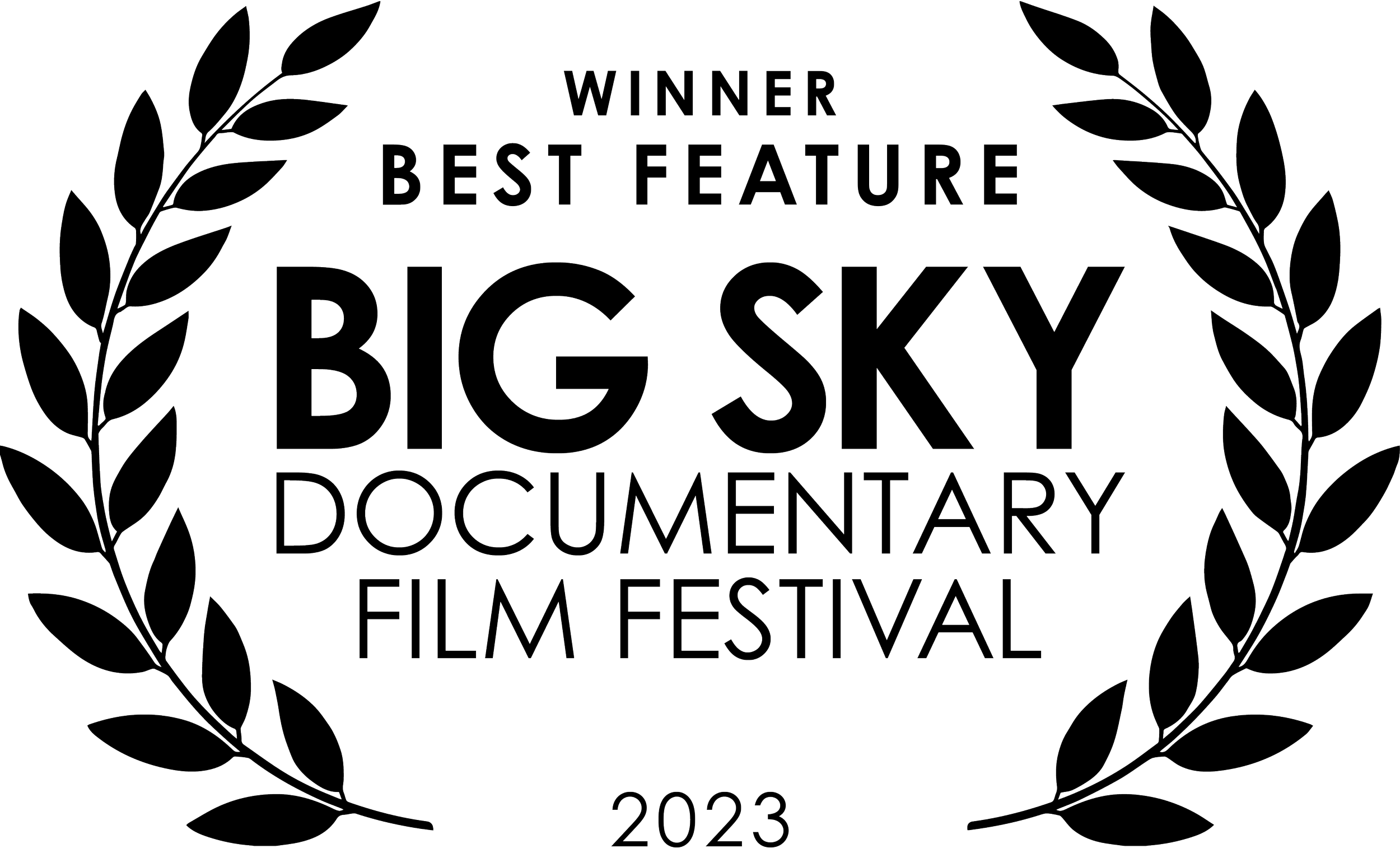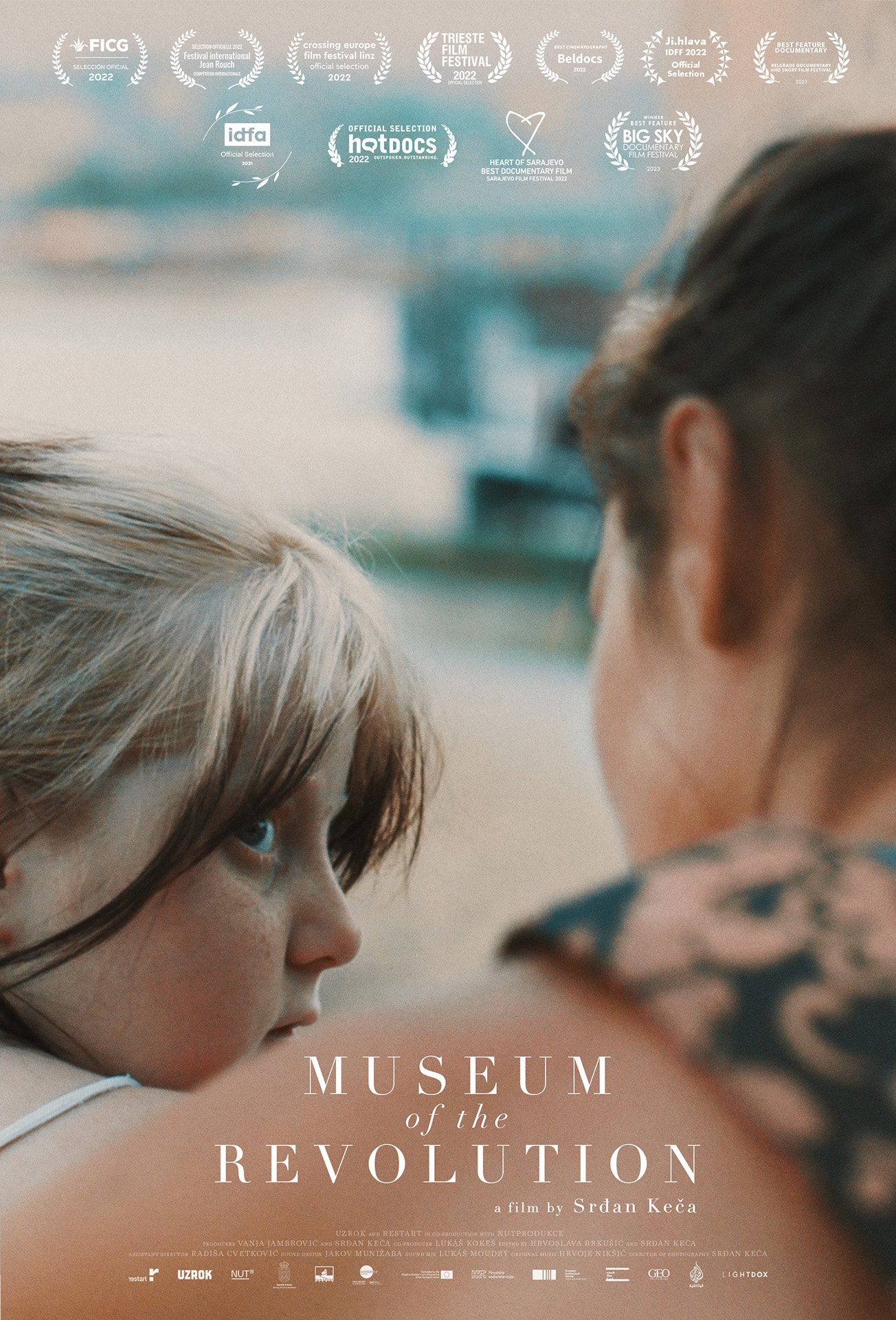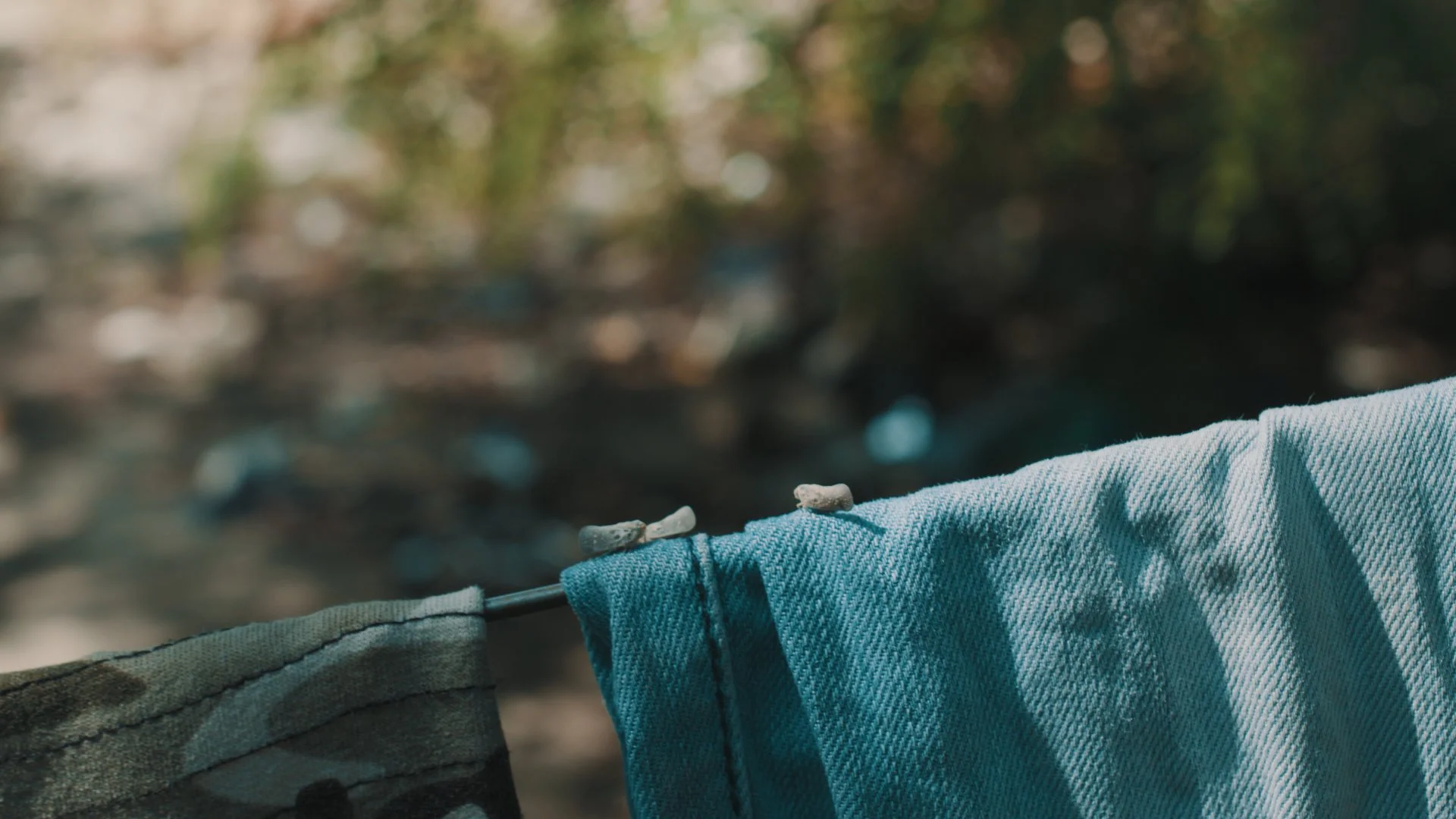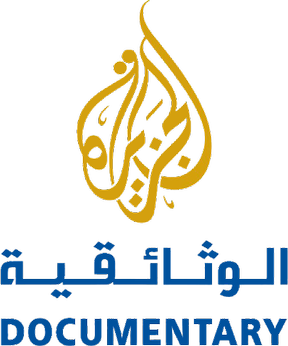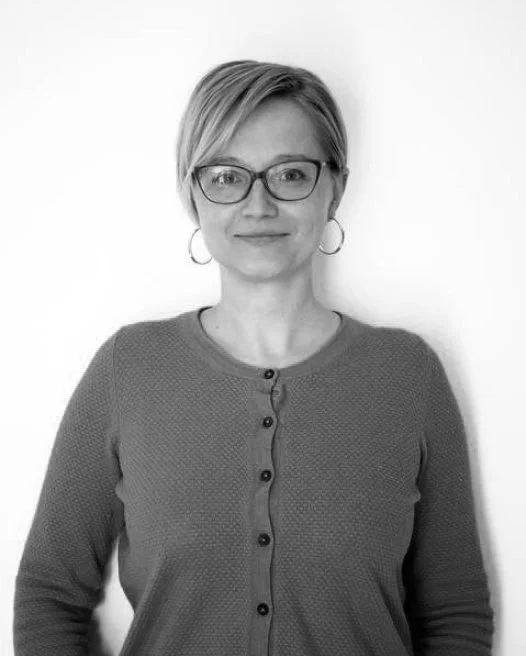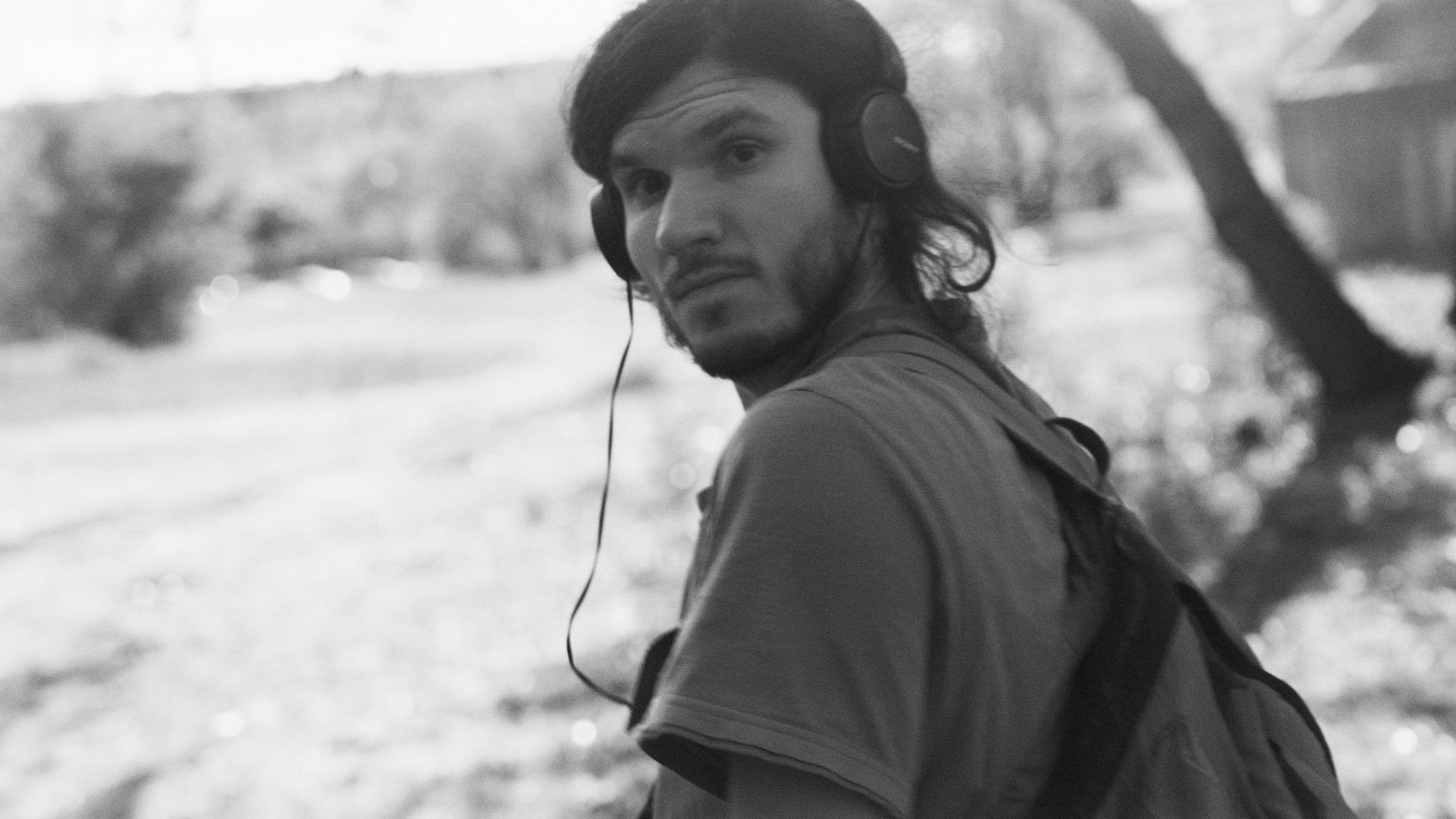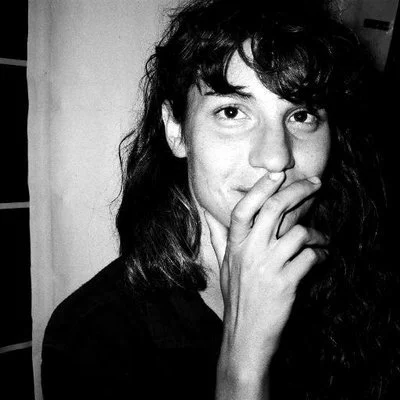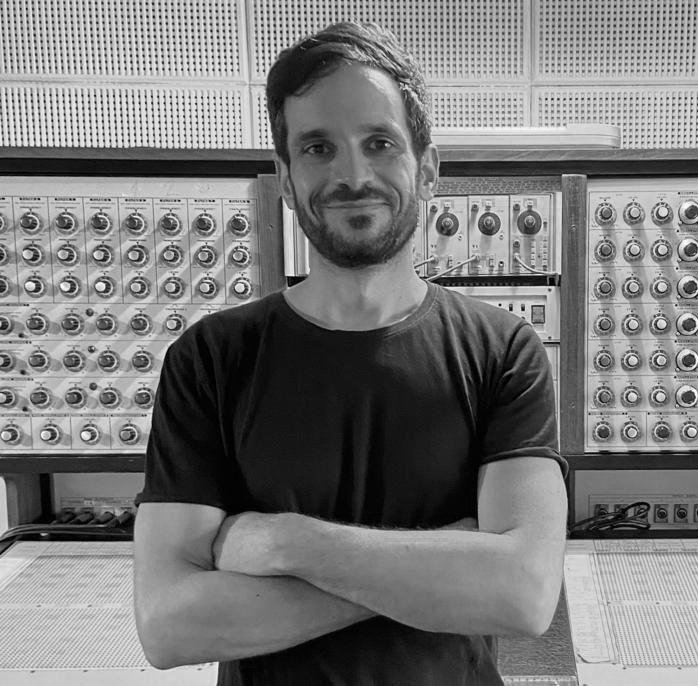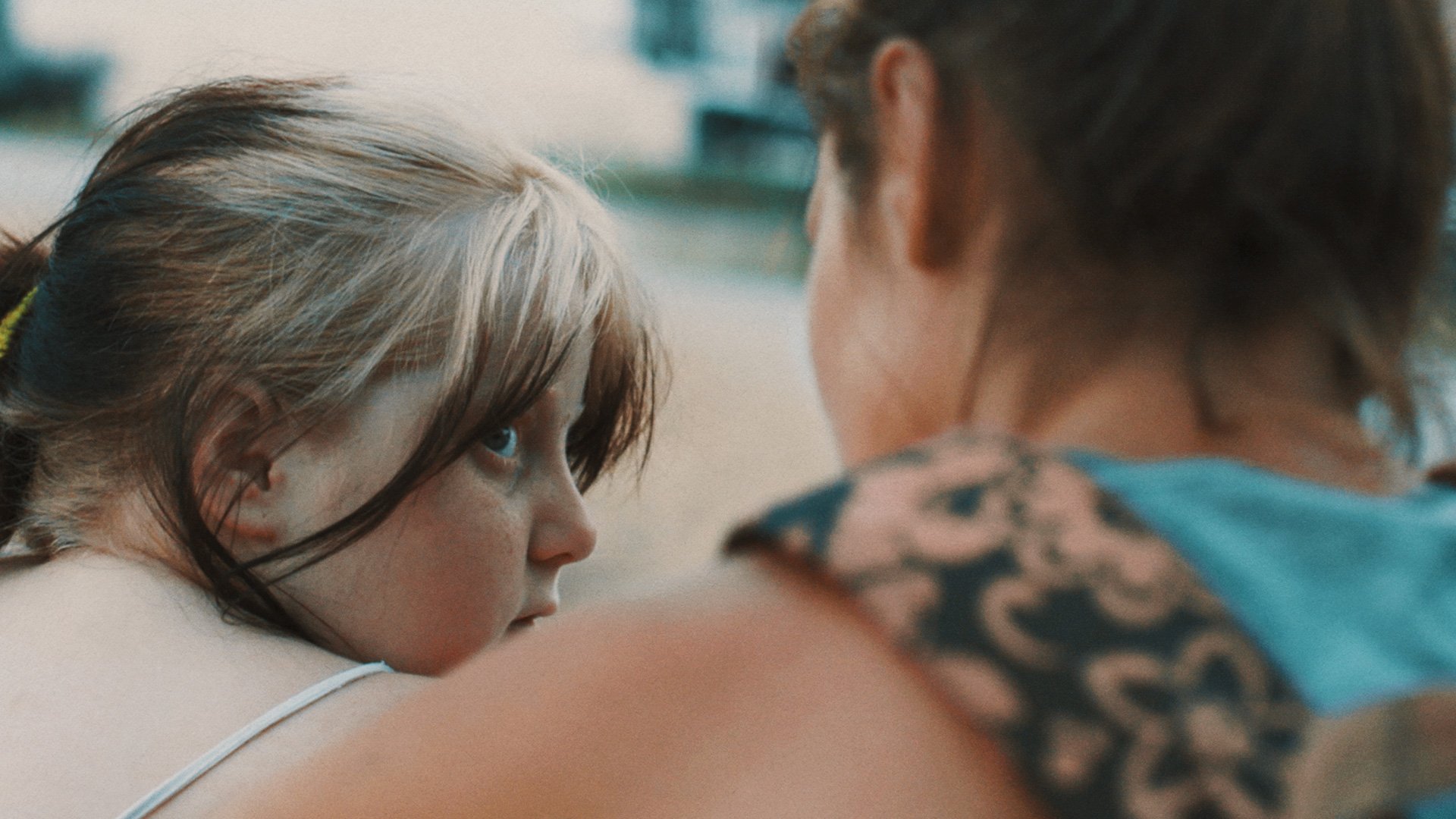
Museum of the Revolution
a film by SRĐAN KEČA
“Engrossing”
— The New York Times
“Wondrous”
— Senses of Cinema
“Lush and dreamlike”
— Deadline
“Observational cinema at its best”
— POV Magazine
About the Film
“The wind got up in the night and took our plans away,” reads the proverb in the opening titles of Museum of the Revolution. The words are a reference to the 1961 plan to build a grand museum in Belgrade as a tribute to Socialist Yugoslavia. Meant to “safeguard the truth” about the Yugoslav people, the plan never got beyond the construction of the basement.
The derelict building now tells a very different story from the one envisioned by the initiators 60 years ago. In the damp, pitch-dark space live the outcasts of a society reshaped by capitalism. The film focuses on a girl who earns cash on the street by cleaning car windows with her mother. The girl has a close friendship with an old woman who also lives in the basement. Against the background of a transforming city, the three women find refuge in each other.
Srđan Keča’s quiet observational documentary Museum of the Revolution is set in the purlieus of a onetime utopian building project: a monument to Yugoslavia that was meant to serve as a socialist gathering space. The structure was abandoned in the late 1970s, and today its unfinished basement level has become the dwelling place for a small community of unhoused people.
The film opens with archival footage of a midcentury construction site, but soon pivots to showcase a series of haunting images of the museum as it currently stands: dark, dank and littered with debris. Successive scenes focus on three inhabitants of the space: an older woman named Mara, a boisterous child named Milica and Milica’s weary mother, Vera, who earns money scrubbing the windshields of cars stopped at motorway red lights.
“Keča often captures the women during spells of waiting, and builds a mood of transience by depicting them across seasons, spaces and hours of the day. This is an engrossing documentary, and one that raises questions about the ethics of intervening (or not) in the lives of people struggling to get by.”
“Keča observes the lives of these three women with an astutely poetic eye. Young Milica boldly takes charge of the situation and guides her mother, Vera, through the streets of Belgrade. They wash windshields energetically as cars pass by on the busy road that borders their zone on the periphery from the developments that rise all around them.”
“Museum of the Revolution is an immersive experience that allows viewers to enter the spaces the women inhabit and witness with intimate immediacy the precariousness with which they live day by day.“
“Making shrewd use of long takes, stillness, and silence, the film is a thoughtful meditation on homelessness and survival. Neither objectifying nor sentimentalizing the stories of Milica, Vera, and Mara, the film is a frank look at life on the margins. If the abandoned Museum of the Revolution was meant to be a sign of progress, the film invites viewers to consider the hopes for a society that stands memorialized as a chasm of forgotten dreams.” — Pat Mullen, POV Magazine
“Keča employs a strategy similar to that of another contemporary documentary master, the Italian Gianfranco Rosi, whose films are also about the marginalized and outsiders.”
“He spends a lot of time with his protagonists, slowly gaining and earning their trust, until the camera is hardly an actor in the action and is hardly noticed by those portrayed. There is no trace of suffering pornography in this film, no exploitation of poverty and pain. Keča doesn't film the central, important, sensational moments of these lives, he doesn't exploit his characters to get particularly 'authentic' or dramatic material (…) Through this process of omission, the moments we see seem like fragments of a larger whole, a larger world, a larger life and, of course, post-socialism.” — Philipp Stadelmaier, Die Zeit (translated from German)
“Museum of the Revolution documentary is a brutal monument to predatory capitalism”
Museum of the Revolution ultimately ends on a note of positive female solidarity, of the bonds between mothers and daughters in the face of uncertain, apocalyptic futurity. And that's a lovely, if ominous and ambiguous place to be. This film lives in a place of opacity; the background of the museum notwithstanding, this could be any so-called democratic state in any corner of the so-called democratic world. As the gaps between the haves and the have-nots and between our time and the lessons of the past both increase, Keča tells us how to push forward with grace and love. An idea upon which an entire museum could be built. — Greg Nussen, Boing Boing
"Neither [the protagonists] nor the film report in detail how they all got into this situation. There are clues, and yet Museum of the Revolution leaves the three women with their stories in this taciturn milieu, leaves them enigmatic as we follow their movements through the Serbian capital, past the illuminated houses they cannot afford to rent, and the concerts with projection shows to which they are not invited. Again and again, the camera returns with them to the dimness of the ruins, a place that assembles many other smaller places where rubble is constantly piling up, where dust falls and water drips.”
“With Keča, it is not language that is in the foreground, but a certain atmosphere, the materiality of a late capitalist society whose foundations are in danger of collapsing. (...) Maybe that's what makes the film so interesting: that it is interested in processes of decay and passing on different levels and puts them less in relation to one another than it is up to the viewer to build meaning from their fragments."
"The seasons come and go in this film. Where there was just snow, two friends are now lying singing by the water. Soon a concert hall will be built above the basement as a meeting place for the citizens, soon Mara will die, and soon Milica will go to school. Her father, who only appears on the phone, is about to be released from prison. 'So time is a today, from a hundred years ago to now,' wrote Sasha Marianna Salzmann in the novel 'Außer sich' (2017) and thus gave a good indication of the time that makes this film describable: a film that knows about yesterday and the future, but celebrates and conserves a today that crumbles to dust the moment it becomes tangible and nameable." — Anne Küper, Critic.de (translated from German)
“Srđan Keča’s wondrous film deals with the legacy of the former Yugoslavia depicted in a chronicle about a few homeless people living in a deserted space of a once-planned museum of the Yugoslav revolution.”
“The building plans were abandoned in the late ‘70s. Now, the deserted dark space of the shelter is used as a set for a story about people living there. The vast darkness in the beginning parallels the fate of the once existing country with the cruel destinies of people who simply could not acclimatise to the rules of capitalist greed of today’s post-socialist reality.”
“Underground and the Roma: a director we won’t mention here built his career on these two themes. Keča never even considers going in the same direction in order to exploit his characters and portray them in any stereotypical way. His view of today’s Serbia, its oppressed and marginalised groups and individuals, is diametrically different. People living underground today are exiled, disenfranchised, alienated. They do not fit into the exotic imagination framed as some kind of cinematic truth about the “dirty Balkans”, readymade for Western film festivals.” — Sanjin Pejković, Senses of Cinema
“Reflected in Keča’s gorgeous cinematography is an austere beauty where pockets of hope can be found within pain.”
“Museum of the Revolution is an intimate but painful watch. It captures heartache and frustration more often than it does the moments of joy between its mother and daughter subjects. It shows support systems governed by money and support systems governed by love. The latter serves the film’s purpose perfectly, illustrating a life that could exist without the financial stress that can ruin the happiest of lives and force people into poverty. Combined with the ease that Vera and Milica’s story can be found within many other cities, Museum of the Revolution displays a resilience in the face of adversity that maintains its relevance.” — Christopher Cross, Tilt Magazine
“The thick atmosphere extends [throughout] thanks to Jakov Munižaba's oneiric sound design and Hrvoje Nikšić's ambient drone score, coupled with Keča's intimate, low-angle shots of the girl.”
“Near the end, Keča's camera is travelling on the river at night, filming the new development on the other bank of the Sava: the corrupt, indulgent Belgrade Waterfront project. This Dubai-style mirage (harking back to Keča's Ji.hlava 2012 winner Mirage) is yet another beginning that has so far managed only to deepen the ideological rift in this country of failed revolutions, incomplete reckoning with its past, and ordinary people living in subterranean circumstances, both psychologically and materially.” — Vladan Petkovic, Cineuropa
Select Press Coverage
The New York Times (EN) • BoingBoing (EN) • In Review Online (EN) • Vagues Visages (EN) • This Week in New York (EN) • Die Zeit (DE) • Kino Zeit (DE) • epd Film (DE) • Filmdienst (DE) • Jungle World (DE) • Indiekino (DE) • BAF (DE) • ExBerliner (EN) • SpielFilm (DE) • Vagabunda MX (ES) • Tilt Magazine (EN) • The Extra Mile (EN) • Screenfish (EN) • Ubiquarian (EN) • Cineuropa (EN) • Business Doc Europe (EN) • Universal Cinema (EN) • The Daily Californian (EN) • Deadline (EN) • Cineuropa – Trailer Release (EN) • Film New Europe (EN) • Variety (EN) • Filmkommentaren.dk (EN) • Jutarnji List (HR) • Filmoskopija (SR) • Radio Sarajevo (BH) • Slobodna Dalmacija (HR) • Pobjeda (ME)
Select Interviews
Filmmaker Magazine (EN) • Moveable Fest (EN) • Point of View Magazine (EN) • Cineuropa (EN) • Courrier des Balkans (FR) • Fred FM (EN) • Film School Radio (EN) • True Story Podcast (EN) • IDF Creative Dialogue Sessions (EN) • Portal Novosti (HR) • Blic (SR) • Danas (SR) • Kurir (SR)
Filmmakers on Museum of the Revolution
“Monumental in its tender exploration of hope lost and found.”
— Kirsten Johnson
Director of Dick Johnson Is Dead (2020), Cameraperson (2016)
“A cinematically subtle yet powerful essay about human destiny, about the weakest who find refuge in the ruins of the former Museum of the Revolution… A powerful metaphor. The film is visually and sonically nuanced, without cheap sentimentality or any clichés. A delicate, beautifully composed and intense film.”
— Helena Třeštíková
Director of Forman vs. Forman (2019), Marcela (2007)
“Unfolding in revelatory fragments through patient camerawork resonant with the works of Jana Ševčíková and Wang Bing, Srđan Keča's intimate portraiture navigates the indelible tenderness, hardships, and resilience shared between the unhomed trio towards an overlooked mirror of contemporary Serbia.”
— JP Sniadecki
Director of El Mar La Mar (2017), The Iron Ministry (2014)
“We want to award this film for its wonderful creative work on many levels: directing, camerawork, sound, editing, dramaturgy. The filmmaker is a master in showing and not telling. We as the jury valued that very highly. All of these ingredients made us witness the world of a strong little girl, living in a fragile environment, navigating through life. The unconditional love portrayed in the film against all odds makes us question and wonder what is right and what is wrong, and who we are to judge.”
— Salome Jashi, Hilal Baydarov, Margje de Koning
Statement of the Documentary Competition Jury at Sarajevo Film Festival 2022
“The jury presents the Best Feature Award to Museum of the Revolution, an incredibly intimate, patient and formally ambitious observational documentary unlike anything we’ve ever seen.”
— Dara Messinger, Ryan Maxey, Samir Ljuma
Statement of the Feature Documentary Jury at Big Sky Documentary Festival 2023
-
IDFA
Nominated for Best First Feature
November 17-28, 2021
Amsterdam, The Netherlands -
Human Rights Film Festival
Opening Film
December 5-11, 2021
Zagreb, Croatia -
Trieste Film Festival
Documentary Competition
January 21-30, 2022
Trieste, Italy -
Crossing Europe Film Festival
Documentary Competition
April 27-May 2, 2022
Linz, Austria -
HotDocs International Documentary Festival
World Showcase
April 28-May 8, 2022
Toronto, Canada -
International Film Festival Jean Rouch
International Competition
May 5-10, 2022
Paris, France -
Beldocs International Documentary Film Festival
Opening Film
Winner - Best Cinematography
May 11-16, 2022
Belgrade, Serbia -
Festival Internacional de Cine en Guadalajara - FICG
Panorama Documental
June 10-18, 2022
Guadalajara, Mexico -
Sarajevo Film Festival
Winner - Heart of Sarajevo Award for Best Documentary
August 12-19, 2022
Sarajevo, Bosnia and Herzegovina -
Liburnia Film Festival
Out of Competition
August 24-28, 2022
Opatija, Croatia -
Manaki Brothers Film Festival
Opening Film of the Documentary Competition
19-26 August
Bitola, Macedonia -
AJB DOC Film Festival
Last Minute Cinema Program
September 9-13, 2022
Sarajevo, Bosnia and Herzegovina -
Sofia Documental
Power of the Image Program
September 19-28, 2022
Sofia, Bulgaria -
DOCK Film Festival
Competition
September 17-22, 2022
Burgas, Bulgaria -
Mediterranean Film Festival
Competition - Feature Length
October 11-15, 2022
Široki Brijeg, Bosnia and Herzegovina -
MIRAGE
Official Selection
October 12-16, 2022
Oslo, Norway -
Jihlava IDFF
Constellations
October 25-30, 2022
Jihlava, Czech Republic -
Windsor International Film Festival
Official Selection
October 27 - November 6, 2022
Windsor, Canada -
Escales Documentaires
Official Selection - Competition
November 8-13, 2022
La Rochelle, France -
Tbilisi International Film Festival
DOCA (Documentary Association Georgia) curated programme
December 4-11, 2022
Tbilisi, Georgia -
Big Sky Documentary Film Festival
Winner - Best Feature
February 17-26, 2023
Missoula, MT, USA -
Belgrade Documentary and Short Film Festival
Winner - Best Feature Documentary
March 28-April 4, 2023
Belgrade, Serbia -
San Francisco Documentary Festival
SF Bay Area Premiere
June 1-11, 2023
San Francisco, CA, USA -
Underhill Fest
Winner - Best Feature Documentary - Regional Competition
June 7-14, 2023
Podrogrica, Montenegro
-
Germany
Start: September 1, 2022
Distributor: Deja-Vu Film -
Croatia
Start: September 23, 2022
Distributor: Restart Label -
Canada
Period: October 28 - November 2, 2022
Location: Cinematheque Winnipeg -
USA
DCTV Firehouse Cinema
May 19-16, 2023 -
Czechia, Slovakia, Hungary, Romania, Georgia
Distributor: KineDok International Network
Period: 2023-24
Broadcast & VOD
Al Jazeera Documentary Channel
First broadcast:
February 23, 2023
20:00 Mecca Time
RTL GEO Television
First shown:
November 14, 2022
20:15 CET
Check schedule on GEO TV website
Check schedule on TVSpielFilm
Watch on demand in Germany, Austria and Switzerland
Team
Srđan Keča – director, writer, cinematographer
Srđan Keča’s medium-length films A Letter To Dad (IDFA 2011, Dokufest 2011 - Best Balkan Documentary) and Mirage (Jihlava IDFF 2012 - Best Central and Eastern European Documentary) screened at leading documentary film festivals, while his video installations have been exhibited at venues like the Venice Biennale of Architecture and the Whitechapel Gallery. The found-footage feature documentary Flotel Europa, produced and edited by Keča, premiered at the 2015 Berlin Film Festival, winning the Tagesspiegel Jury Prize. His debut feature documentary as director, Museum of the Revolution, premiered at IDFA 2021.
Keča is a graduate of the Ateliers Varan and the UK National Film and Television School (NFTS). Since 2015 he has worked as Assistant Professor in the Department of Art & Art History at Stanford University, teaching in the MFA Documentary Film program.
Website: https://skeca.com
Vanja Jambrović – producer
Since 2009 she’s been making films with Restart as a delegate producer. Vanja’s track record includes more than 20 films of all shapes and sizes. Her films have circled the globe, having been screened in competition at IDFA, Hot Docs, Toronto IFF, Visions du Reel, Fid Marseille, Karlovy Vary IFF, Sarajevo FF and hundreds more. Vanja is also a Sundance Institute Documentary Film Program Grantee, for the feature documentary project “Museum of the Revolution” directed by Srđan Keča (2021). A film that she produced, «Srbenka» (2018) directed by Nebojša Slijepčević, has been preselected for EFA Awards in the best documentary category in 2018 and won Doc Alliance Award for the best documentary in 2018. With her projects Vanja was a part of several professional workshops such as: EAVE (2015), Producers on the move (Cannes 2014), Robert Bosch Coproduction Prize Germany Eastern Europe (Berlin, 2013), Berlinale Talent Campus (Berlin, 2013), Emerging Producers 2012 (Jihlava), Sarajevo Talent Campus (Sarajevo, 2012), EURODOC (France 2010) and many more. Since 2020 Vanja is teaching Documentary Production at the Academy of Dramatic Arts in Zagreb.
Radiša Cvetković – assistant director
Radiša Cvetković graduated in philosophy at the Faculty of Philosophy in Belgrade. He worked as a film journalist, worked on film festivals, and participated in workshops and masterclasses in Serbia and the Balkans. For the past 10 years he has worked at the Yugoslav Cinematheque, where he is currently Mediatheque and Library Manager and Associate Programmer. He participated in projects like FEST Museum (as an archival researcher), Conversations in the Cinematheque (as a moderator) and the Film Section for High School Students in the Yugoslav Cinematheque (as an educator). He has written film reviews, organized programs and lectures on film, and worked on several short and feature-length fiction films and documentaries: Museum of the Revolution by Srđan Keča (Assistant Director, Sound Recordist, Archival Researcher), the Omnibus Equals (Assistant Director to Mladen Djordjevic), Labor Day by Mladen Đorđević (Assistant Director), Loop by Milutin Petrović (Assistant Director), Aleksandra by Saša Radojević (Sound Recordist), and the Children's series Skipping with Dunja (Cameraman).
Hrvoslava Brkušić – editor
Graduate of the Academy of Dramatic Arts in Zagreb, Editing department and Academy of Fine Arts, New Media Department. She edited films that have participated in festivals such as Rotterdam Film Festival, Toronto, Locarno, Oberhausen, CPH Dox, 25 fps, etc.
Her artistic practice takes shape in a variety of media - sound installations, live performances, film and video. Her main idea and interest in her artistic approach is exploring sound behavior through experimenting with frequencies and waves in general and exploration of different media possibilities and materials (16 mm film, DV techniques, digital media). She is constantly seeking new expression in film language, experiencing film not only as a medium of telling a story but also as a new tool in the way of seeing the world we are in. She is a member of the analog film lab Klubvizija Zagreb, and co-founder of the female artistic collective Ljubavnice.
Hrvoje Nikšić – music composer
Zagreb-based composer, musician, music producer, sound designer and engineer, engaging the Croatian alternative and experimental music scene for over twenty five years, and the owner of the music production studio “Kramasonik” for over fifteen. As a composer and sound engineer, he has worked on a myriad of sound projects including composing music for theater, radio dramas, and films. In 2008 he was one of the laurates in the category of electronic music in the National Award for the Promotion of Music. During the years he was nominated several times for the Croatian discography award "Porin" in the categories of production and sound engineering in jazz, world music and alternative music categories. He is also the winner of that award in 2015 in the category of a producer for the best jazz edition of the year. Performed live at some of the region’s most prestigious experimental music events, such as the Showroom of Contemporary Sound, Zagreb; Music Biennale, Zagreb; 25FPS film festival, Zagreb; and the Museum of Contemporary Art.
Jakov Munižaba – sound designer
Sound editor and sound designer for about one hundred movies shown in prime festivals such as Cannes, Venice, Berlin, Amsterdam, Athens, Locarno, Copenhagen, etc. Sound recordist for film and sound-art projects all around the globe and working as an regular associate at Radio Belgrade’s Electronic music studio. Worked on many awarded radio and theater plays and sound-art installations. Finished doctoral thesis in Audio-visual arts in 2019th. Teaching sound design in Belgrade’s University since 2007, based in Belgrade, Serbia.
Basic Info
Original title: Muzej revolucije
English title: Museum of the Revolution
Countries: Serbia, Croatia, Czech Republic
Languages spoken: Serbian, Romany
Running Time: 91 min / 52 min
World premiere: IDFA 2021 – Luminous – Nominated for Best First Feature
Key Credits
Written and directed by: Srđan Keča
Producers: Vanja Jambrović, Srđan Keča
Co-producer: Lukáš Kokeš
Associate producers: Sara Stojković, Oliver Sertić
Assistant director: Radiša Cvetković
Cinematographer: Srđan Keča
Edited by: Hrvoslava Brkušić, Srđan Keča
Sound designer: Jakov Munižaba
Original music: Hrvoje Nikšić
Sound recordist: Radiša Cvetković
Sound re-recording mixer: Lukáš Moudrý / Studio Beep, Prague
Colorists: Robert Arnold / Lateral Films, Catalin Miloiu / Avanpost Media
Graphic designer: Midnight Marauder
Museum of the Revolution is a production of:
UZROK (Serbia) and RESTART (Croatia)
In co-production with:
NUTPRODUKCE (Czech Republic)
Croatian Radiotelevision / HRT (Croatia)
Al Jazeera Documentary Channel (Qatar)
With the support of:
Sundance Institute Documentary Film Program with support from Just Films/Ford Foundation and the Open Society Foundations
Ministry of Culture of the Republic of Serbia
Film Center Serbia
Media Programme of the European Commission
Croatian Audiovisual Center
Czech Film Fund
Geo Television
Museum of the Revolution was developed through:
Beldocs in Progress 2018
Dok Co-Pro Market 2018 during International Leipzig Festival for Documentary and Animated Film
ZagrebDox Pro pitching forum 2019
EAST DOC FORUM 2019 organized by the Institute of Documentary Film, Czech Republic
IDFA Forum 2019
Docu Rough Cut Boutique 2020
When East Meets West - Last Stop Trieste 2021


